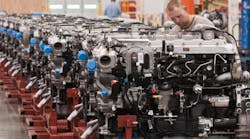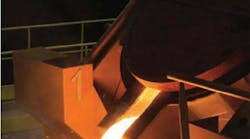Ford Motor Co. president and CEO Alan Mulally outlined the auto builder’s strategies for developing fuel-efficient designs in an address to the Los Angeles Auto Show last week. The statement came together with the news that Ford’s unionized workers had accepted a new four-year labor agreement that sets up future workforce downsizing and eliminates some future benefits obligations.
The combined impact may be to renew confidence in the “sustainability” of Ford as an enterprise. The details of Mulally’s presentation may be seen as an effort by the company to address customers’ and investors’ concerns as U.S. gasoline prices continue a steady climb and new vehicle sales continue to lag Ford’s domestic and imported competition.
“Ford is committed to offering customers affordable, environmentally friendly technologies in vehicles they really want,” Mulally assured. “We are focusing on sustainable technology solutions that can be used not for hundreds or thousands of cars – but for millions of cars, because that is how Ford can truly make a difference.”
Mulally indicated Ford has modeling tools to guide its fuel-economy plan through 2020, and that these will help to determine which technology solutions are viable over time by balancing customer wants, cost, and environmental needs.
A central element of Ford’s strategy is to continue reducing vehicle weights by 250-750 lb., though these changes may not be significant until 2012 because of the time needed to bring new technologies to production levels.
Aluminum and high-strength steels will be the materials most in demand by Ford for its future designs, because lighter chassis and suspension components will make it possible to build around smaller engines.
According to Ford, its engine platform will be a series of smaller-displacement turbo-charged gasoline engines with advanced direct injection technologies. Ford says these engines will deliver fuel savings of 10-20% without compromising performance.
Some fuel-saving improvements are already available, Ford says, while others are still waiting to be commercialized. Ford cited current examples where it is eliminating energy waste in power steering, cooling, and electrical systems, and minimizing wind drag via design and optimization of new 6-speed transmissions.
The company promised further details of its new 4-cylinder and V-6 engine configurations in January.
Other elements of Ford’s “sustainability” strategy include continuing to develop products capable of running on fuels like bio-diesel, ethanol, clean diesel, and hybrid vehicles, as well as hydrogen fuel cells and hydrogen-fueled internal combustion engines.
The company says it is pursuing “multiple technological paths” and working with partners to arrive at affordable, meaningful solutions for safer, more fuel-efficient, quality products that car buyers will value.
Latest from Uncategorized
Latest from Uncategorized
Uncategorized
Newsletter Confirmation Page
May 27, 2013
Uncategorized
Vented Safety Helmet
July 21, 2012
Melt/Pour
A Plan Comes Together
July 5, 2012
Uncategorized
Convert Microscope to Videoscope
July 2, 2012
Uncategorized
Robot Programming with Tablet-PC
July 2, 2012



